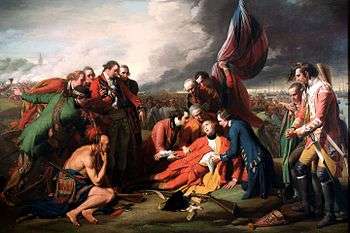1783 in Canada
| Years in Canada: | 1780 1781 1782 1783 1784 1785 1786 |
| Centuries: | 17th century · 18th century · 19th century |
| Decades: | 1750s 1760s 1770s 1780s 1790s 1800s 1810s |
| Years: | 1780 1781 1782 1783 1784 1785 1786 |
| Part of a series on the |
| History of Canada |
|---|
| Timeline |
| Historically significant |
| Topics |
| By Provinces and Territories |
| See also |
|
Events from the year 1783 in Canada.
Incumbents
| Monarch | George III of the United Kingdom |
| Governor General of British North America | Frederick Haldimand |
| Commodore-Governor of Newfoundland | John Campbell |
| Governor of Nova Scotia | John Parr then Edmund Fanning |
| Governor of Prince Edward Island | Walter Patterson |
| Commander-in-Chief, North America | Guy Carleton, 1st Baron Dorchester then John Campbell, of Strachur |
| Bishop of Quebec | Jean-Olivier Briand |
Events
- American independence is formally recognized at the Treaty of Paris.
- Treaty of Paris gives Americans fishing rights off Newfoundland.
- The success of the rebellious 13 American colonies leaves the British with the poorest remnants of their New World empire and the determination to prevent a second revolution. However, they have to accommodate the roughly 50,000 refugees from the American Revolution who settle in Nova Scotia and the upper St. Lawrence. These United Empire Loyalists soon begin to agitate for the political and property rights they had previously enjoyed in the thirteen colonies.
- British North America consists of the colonies and territories of the British Empire in continental North America after the end of the American Revolutionary War and the recognition of American independence.
- More than 5,000 Black People leave the United States to live in the Maritimes, Quebec and Ontario. Having sided with the British during the American War of Independence, they come to Canada as United Empire Loyalists, some as free men and some as slaves. Although promised land by the British, they receive only varying amounts of poor-quality land, and, in fact, some receive none at all.
- In Annapolis Royal, Nova Scotia, Rose Fortune becomes Canada's first policewoman.
- The border between Canada and the U.S. is accepted from the Atlantic Ocean to Lake of the Woods.
- In the area around the mouth of the Saint John River, those who fled the thirteen American colonies by 1783 are called United Empire Loyalists. Those who arrived after 1783 were called Late Loyalists.
- Pennsylvania Germans begin moving into southwestern Ontario.
- The North West Company is formed.
- January 20 – Preliminaries of peace are signed between Great Britain and the United States.
- Vermont delays entering the Union, because Congress is partial to New York, and because of the General Government's indebtedness, for which Vermont is not bound.
Births
- April 26 – Peter Boyle de Blaquière, political figure and first chancellor of the University of Toronto (d.1860)
Death
Paul Jackson
See also
This article is issued from Wikipedia. The text is licensed under Creative Commons - Attribution - Sharealike. Additional terms may apply for the media files.
